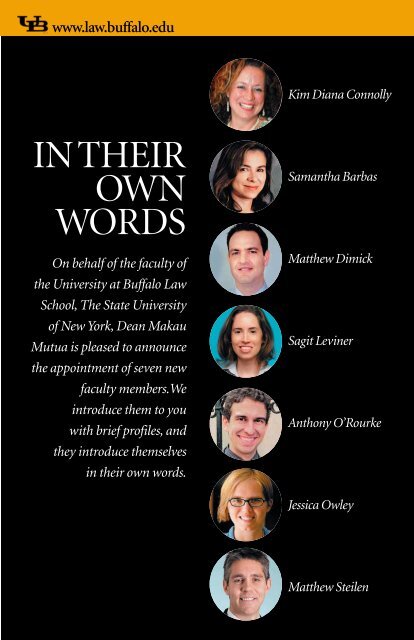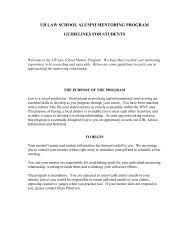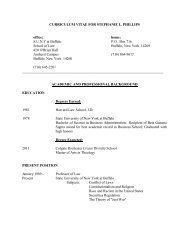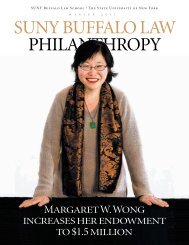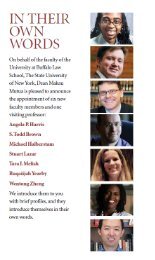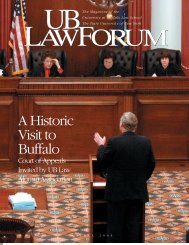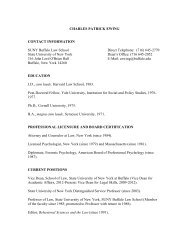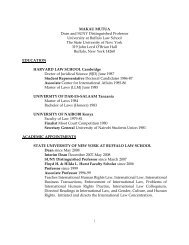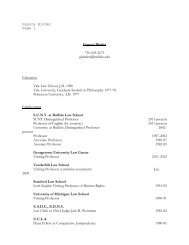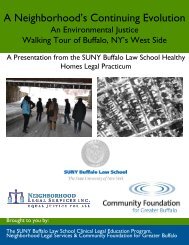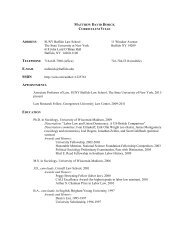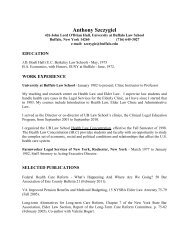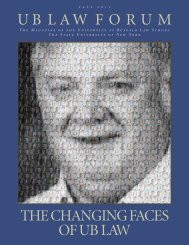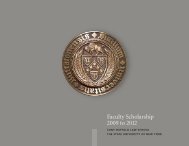Introducing Kim Diana Connolly, Samantha Barbas, Matthew Dimick ...
Introducing Kim Diana Connolly, Samantha Barbas, Matthew Dimick ...
Introducing Kim Diana Connolly, Samantha Barbas, Matthew Dimick ...
Create successful ePaper yourself
Turn your PDF publications into a flip-book with our unique Google optimized e-Paper software.
www.law.buffalo.edu<br />
<strong>Kim</strong> <strong>Diana</strong> <strong>Connolly</strong><br />
INTHEIR<br />
OWN<br />
WORDS<br />
On behalf of the faculty of<br />
the University at Buffalo Law<br />
School, The State University<br />
of New York, Dean Makau<br />
Mutua is pleased to announce<br />
the appointment of seven new<br />
faculty members.We<br />
introduce them to you<br />
with brief profiles, and<br />
they introduce themselves<br />
in their own words.<br />
<strong>Samantha</strong> <strong>Barbas</strong><br />
<strong>Matthew</strong> <strong>Dimick</strong><br />
Sagit Leviner<br />
Anthony O’Rourke<br />
Jessica Owley<br />
<strong>Matthew</strong> Steilen
<strong>Kim</strong> <strong>Diana</strong> <strong>Connolly</strong><br />
Professor and Director of<br />
Clinical Legal Education<br />
Following her undergraduate work in chemistry at the<br />
University of North Carolina at Chapel Hill, where she was a<br />
Morehead Scholar, Professor <strong>Kim</strong> <strong>Diana</strong> <strong>Connolly</strong> earned her<br />
J.D. magna cum laude from Georgetown University Law Center<br />
and her LL.M. with highest honors from George Washington<br />
University Law School.<br />
An expert in natural resources and environmental law,<br />
particularly wetlands law and policy and other Clean Water Act<br />
matters, <strong>Connolly</strong> has published scholarly works in Environmental<br />
Law Reporter, Georgetown International Environmental<br />
Law Review, Catholic University Law Review, Wyoming Law<br />
Journal, Washington University Journal of Law and Policy,<br />
Vermont Journal of Environmental Law, Southeastern Environmental<br />
Law Journal and other publications. She speaks regularly<br />
at national and international conferences regarding wetlands,<br />
coastal and other environmental law and policy matters.<br />
<strong>Connolly</strong> is past president of the Clinical Legal Education<br />
Association and serves on that group’s Executive Committee and<br />
as chair of its Outcome Measures Committee and co-chair of the<br />
CLEA New Clinicians Conference. She also runs the national<br />
environmental clinicians listserv and manages the database of<br />
clinical legal educators and directors for CLEA.<br />
• • •<br />
<strong>Connolly</strong> writes and teaches in the areas of environmental law,<br />
clinical legal education, and law teaching methodology.<br />
My research<br />
focuses on a<br />
number of<br />
related areas,<br />
including wetlands law and<br />
policy as well as other<br />
environmental regulatory and<br />
related subjects. I also have<br />
conducted research on student<br />
learning and andragogical issues<br />
(learning theory focusing on<br />
adult learners).In all cases I seek<br />
to bring serious scholarly study<br />
to pressing issues facing people<br />
and ecosystems on various<br />
levels.<br />
The law and policy<br />
governing wetland and other<br />
waters is fascinating to me. As I<br />
write in a forthcoming piece,<br />
“Wetlands are nifty.Biologically<br />
diverse systems that provide<br />
vital services to their local<br />
communities and the planet as a<br />
whole,wetlands of some sort are<br />
found in every state throughout<br />
the United States and in every<br />
nation in the world.”Yet as I<br />
described in another published<br />
piece,“throughout the United<br />
States are subject to diverse<br />
forms of regulation by local,<br />
state,and federal authorities…<br />
[as well as] international<br />
cooperative efforts…”In the<br />
evolution of my wetlands<br />
scholarship,I have focused on<br />
what is happening on the<br />
ground to wetlands/waters and<br />
the real people,communities,<br />
and ecosystems that depend<br />
upon them.<br />
For example,my Any Hope<br />
for Happily Ever After?<br />
Reflections on Rapanos and the<br />
Future of the Clean Water Act<br />
recommended a change in the<br />
actual language of the Clean<br />
Water Act by assessing the<br />
history of section 404 and<br />
ultimately concluding that<br />
“short of new magic words in<br />
the form of legislative<br />
clarification of CWA Sections<br />
404 and 502,the battles will<br />
persist in courts,and the<br />
difficulties of administering this<br />
law will continue to plague the<br />
Corps and EPA.”This is an<br />
example of how I base some of<br />
my scholarship to my on-going<br />
practice and activity in policy<br />
matters. I co-authored a U.S.<br />
Supreme Court amicus brief on<br />
the case I explore in that article,<br />
and presented my<br />
recommendation for a change<br />
in the statute (with a copy of the<br />
actual scholarly work) in<br />
testimony to the U.S.House of<br />
Representatives Committee on<br />
Transportation and<br />
Infrastructure.I have also<br />
performed grant-funded,<br />
interdisciplinary co-authored<br />
and empirical scholarship on<br />
wetlands and related matters.<br />
One forthcoming piece due<br />
to be published this year<br />
connects my ongoing wetlands<br />
research to the largest collective<br />
area of research among<br />
environmental scholars at this<br />
time: the issue of climate<br />
change.In a book chapter I<br />
tackle the two-fold role of<br />
wetlands in the climate change<br />
arena,both as ecosystems that<br />
will receive heavy negative<br />
impact due to the changes our<br />
planet will continue to<br />
experience in light of a<br />
changing climate,and as<br />
ecosystems with some potential<br />
– according to the scientists<br />
who study their functions – to<br />
play a vital role in mitigation<br />
and adaptation to the shifting<br />
world.<br />
Beyond wetlands,I have and<br />
continue to write in a couple of<br />
other areas. For example,I am<br />
finishing a book on a fairly new<br />
area of interest to me,exploring<br />
the ways in which the media<br />
portray (or fail to portray)<br />
environmental law and policy.<br />
Over the course of my<br />
academic career I have<br />
researched and written a few<br />
pieces on student learning and<br />
effective teaching.I enjoy doing<br />
research on andragogy to help<br />
deepen my ability to create a<br />
strong classroom learning<br />
environment and exchange<br />
ideas with other professors who<br />
share the same passion.
<strong>Samantha</strong> <strong>Barbas</strong><br />
Associate Professor<br />
A Seattle native, Associate Professor <strong>Samantha</strong> <strong>Barbas</strong> did her<br />
undergraduate work in political science at Williams College, then<br />
went on to earn a Ph.D. in history from the University of<br />
California at Berkeley, and then the J.D. from Stanford Law<br />
School. Her scholarship as a historian has centered around film<br />
and media history, including two books: a biography of gossip<br />
writer Louella Parsons called The First Lady of Hollywood<br />
(University of California Press, 2005) and Movie Crazy: Fans,<br />
Stars and the Cult of Celebrity (Palgrave Macmillan, 2001).<br />
In her writing she has combined her skills as a historian with the<br />
analytical mind of a legal scholar. She has written on the history<br />
of privacy law, the origins of broadcasting policy, film censorship,<br />
and the development of modern free speech law.<br />
• • •<br />
<strong>Barbas</strong> writes and teaches in the areas of legal history, first<br />
amendment law and mass media law.<br />
My work<br />
examines the<br />
interconnections<br />
between<br />
law, social history and the<br />
history of mass communications.<br />
Drawing on my earlier<br />
research in media history,<br />
published as Movie Crazy:<br />
Fans, Stars, and the Cult of<br />
Celebrity (Palgrave Macmillan,<br />
2001), and The First Lady of<br />
Hollywood (University of<br />
California Press, 2005), it<br />
focuses on the first modern<br />
media revolution – the advent<br />
of mass-market publishing,<br />
radio, film, and television in<br />
the early to mid twentieth<br />
century. Mass media expanded<br />
the horizons of knowledge and<br />
created new opportunities for<br />
social connection and<br />
participation.At the same<br />
time, they impersonalized<br />
relationships, blurred the<br />
boundaries between public<br />
and private, and centralized<br />
control over information in the<br />
media industries. My research<br />
into how American law and<br />
culture addressed these<br />
paradoxes of mass<br />
communication in the past can<br />
shed light on how we might<br />
address the challenges posed by<br />
our own twenty-first century<br />
communications revolution.<br />
In the 1930s and 40s, media<br />
critics identified a fundamental<br />
tension of mass<br />
communications: that mass<br />
media allow the whole world<br />
to see and hear but permit<br />
relatively few to speak. In<br />
“Creating the Public Forum,”<br />
in the Akron Law Review,I<br />
described one historical<br />
response to this problem: a<br />
social movement in the World<br />
War II era that cast the First<br />
Amendment as a state<br />
obligation to provide average<br />
citizens a means to address a<br />
public audience. Present-day<br />
broadcasting policy, and the<br />
public forum doctrine, are<br />
legacies of this “public forum”<br />
movement.<br />
Does the medium matter?<br />
Should ideas be regarded<br />
differently under the First<br />
Amendment if they appear in<br />
print, over the airwaves, or on<br />
a computer screen? A<br />
forthcoming work,“How the<br />
Movies Became Speech,”<br />
explores how this question<br />
was addressed in debates over<br />
the constitutionality of<br />
motion picture censorship in<br />
the early twentieth century.<br />
Developing the concept of<br />
social convergence of<br />
communications, it argues<br />
that movies, initially regarded<br />
as outside the First<br />
Amendment, became<br />
constitutionally protected<br />
“speech”when they converged<br />
with print media, and offers<br />
convergence as a paradigm for<br />
understanding the evolution<br />
of free speech law.<br />
I have long been fascinated<br />
with the history of gossip and<br />
celebrity culture, and in an<br />
article in the Yale Journal of<br />
Law and the Humanities, I<br />
explored historical efforts to<br />
address a dilemma that has<br />
taken on new importance in<br />
the Facebook age: how to<br />
balance the legal protection of<br />
privacy with the vast public<br />
interest in private lives. In<br />
ongoing research that will<br />
hopefully culminate in a book<br />
project, I examine the<br />
foundations of modern<br />
privacy law and suggest how<br />
history may help us<br />
conceptualize and protect<br />
privacy in our culture of total<br />
exposure.
<strong>Matthew</strong> <strong>Dimick</strong><br />
Associate Professor<br />
Associate Professor <strong>Matthew</strong> <strong>Dimick</strong>, a cum laude Cornell Law<br />
School graduate whose research focus is labor and employment<br />
law, also has a doctoral degree in sociology from the University<br />
ofWisconsin-Madison. His undergraduate work was in English at<br />
Brigham Young University. He brings an international and<br />
comparative perspective to his scholarly work, exemplified by his<br />
doctoral dissertation, which looked at how labor law has impacted<br />
the internal, democratic practices of trade unions in the United<br />
States and Great Britain.<br />
Before joining UB Law School, <strong>Dimick</strong> was a Law Research<br />
Fellow at Georgetown University Law Center. He has given<br />
multiple presentations before the American Sociological<br />
Association and other professional organizations, and was drawn<br />
to UB Law School by its historical strength in the study of labor<br />
law.<br />
His other scholarly publications include a chapter, “A Profession of<br />
ITs Own: The Rise of Health Information Professionals in<br />
American Healthcare,” in Medical Professionalism in the New<br />
Information Age (Rutgers University Press, 2010).<br />
• • •<br />
<strong>Dimick</strong> writes and teaches in the areas of labor and employment<br />
law, with international and comparative interests, as well as<br />
corporations, empirical legal studies, and law and economics.<br />
My research is<br />
located at the<br />
intersection of<br />
the study of labor markets,<br />
firms,and states,with a view<br />
toward analyzing the<br />
distributive fairness and<br />
allocative efficiency of the laws,<br />
policies,and institutions that<br />
inhabit these domains.The<br />
central question I am interested<br />
in is,Can distributive equity be<br />
achieved without undermining,<br />
and perhaps while enhancing,<br />
economic efficiency?<br />
Several of my current<br />
research projects are devoted to<br />
probing this question.One<br />
paper will investigate the<br />
relationship between labor and<br />
corporate finance.A widely held<br />
view is that labor unions and<br />
proworker legislation have<br />
negative consequences on<br />
corporate finance,by enhancing<br />
worker-manager alliances at the<br />
expense of shareholders and<br />
investors.In contrast,my paper<br />
will argue that under some<br />
conditions,in particular when<br />
collective bargaining<br />
encompasses a sufficiently large<br />
number of employers,workers<br />
and shareholders can find<br />
common ground.A second<br />
paper will analyze the problem<br />
of risk in labor market<br />
regulation.For straightfoward<br />
reasons,the acquisition of<br />
human capital for most workers<br />
is characterized by pervasive risk<br />
as well as an absence of<br />
insurance markets to cover<br />
them.Understanding this<br />
problem can rationalize a wide<br />
variety of legal interventions in<br />
the labor market,from<br />
employment discrimination to<br />
occupational safety and health,<br />
and point in the direction of<br />
improved regulation.A third<br />
paper will address the joint<br />
optimal design of employment<br />
protection and unemployment<br />
insurance,with a focus on the<br />
conditions under which<br />
collective bargaining can<br />
enhance or detract from<br />
efficient employment security.<br />
In addition to these<br />
interests,I am also fascinated by<br />
the ways that legal institutions<br />
shape,without necessarily<br />
dictating,and in sometimes<br />
subtle and indirect ways,the<br />
strategies and preferences of<br />
social actors.For instance,in<br />
“Revitalizing Union<br />
Democracy” (Denver University<br />
Law Review,2010),I wrote<br />
about how the contrasting<br />
labor laws of Great Britain and<br />
the United States differentially<br />
shaped the internal,democratic<br />
practices of trade unions in<br />
each country.Also,in a<br />
forthcoming piece,“Labor Law,<br />
New Governance, and the Ghent<br />
System” (North Carolina Law<br />
Review,2012),I showed how<br />
the “Ghent system,”found in<br />
countries where labor unions’<br />
participate in the<br />
administration of<br />
unemployment insurance,<br />
helps solve some pervasive<br />
problems in collective<br />
employment representation,<br />
without the need for a<br />
traditional regulatory regime.<br />
Another work in progress will<br />
investigate the ways that<br />
positive political-economic<br />
constraints sharply delimit the<br />
normative universe of<br />
politically feasible proposals to<br />
address economic inequality.A<br />
key upshot of my argument will<br />
be that efforts to address<br />
economic inequality through<br />
any type of government<br />
mechanism (including but not<br />
limited to taxes and transfers)<br />
critically depend on first<br />
addressing market (or pretax<br />
and pretransfer) inequality.
Sagit Leviner<br />
Associate Professor<br />
Leviner graduated from the Doctor of the Science of Laws (S.J.D.,<br />
2007) and the Master of Laws (LL.M., 2002) programs of the<br />
University of Michigan Law School (Ann Arbor) where she also<br />
co-taught the 2006-07 Tax Policy Workshop with Professors<br />
Avi-Yonah and Hines and led the 2005-06 Law School S.J.D.<br />
Colloquium. Leviner served as Senior Researcher with the<br />
Internal Revenue Service Nat’l Headquarters (Washington, DC)<br />
from 2007 to 2008. In 2008-09 she visited with the Tel Aviv<br />
University Faculty of Law Cegla Center for Interdisciplinary<br />
Research of the Law. Since 2009, she has been Affiliated Faculty<br />
with Ono Academic College Faculty of Law (Israel).<br />
Leviner’s articles are published with venues such as the Virginia<br />
Tax Review, Michigan Journal of Law Reform, and the Journal on<br />
Regulation and Governance. They appeared on the Social Science<br />
Research Network (SSRN) Top Ten Download List(s) for several<br />
areas, including: (1) Public Economics: Taxation, Subsidies, and<br />
Revenue; (2) Tax Law & Policy; (3) Law Enforcement and<br />
Correction; (4) Regulation; (5) Comparative law; (6) and<br />
Law – General.<br />
• • •<br />
Leviner writes and researches in the area of tax policy, particularly<br />
with respect to tax enforcement, behavioral attributes of taxation,<br />
and the tax burden distribution.<br />
My research<br />
explores the<br />
coming<br />
together of<br />
normative and pragmatic<br />
aspects of tax policy design. It<br />
is interdisciplinary in<br />
orientation and rests on the<br />
premise that developing a solid<br />
understanding of our tax<br />
system and how to best<br />
manage it requires the<br />
consideration of social,<br />
economic and political issues<br />
that reside outside the<br />
immediate world of taxation. I<br />
grew up in Israel and earned<br />
my higher education in the<br />
Unites States. My teaching and<br />
research experience is from<br />
both nations. I received my<br />
bachelor of laws degree with<br />
honors from Haifa University<br />
Faculty of Law in Israel, ranked<br />
fifth in my class, as in much of<br />
the world it is an<br />
undergraduate program there.<br />
I then worked for Israel’s<br />
Ministry of Justice, Office of<br />
the Attorney General Fiscal<br />
Department, in the equivalent<br />
position of a first year<br />
associate.<br />
After successfully passing<br />
the Israeli bar exam I enrolled<br />
at the University of Michigan<br />
Law School, where I earned the<br />
master of laws and a doctorate<br />
in the science of laws (S.J.D.)<br />
degrees, concentrating in tax<br />
policy. My S.J.D. dissertation is<br />
entitled “Taking a Societal<br />
Perspective to Tax Policy: On<br />
the Interface between Public<br />
Policy, Tax Law and Society.”It<br />
draws on my interdisciplinary<br />
approach to taxation and has<br />
yielded three published<br />
articles: two of which<br />
appeared with the Virginia Tax<br />
Review and Michigan’s<br />
Journal of Law Reform,<br />
another article was published<br />
with the interdisciplinary<br />
journal: Regulation and<br />
Governance.A fourth piece is<br />
scheduled to come out later<br />
this year as a chapter in a book<br />
challenging the efficiency<br />
stance of modern tax analysis.<br />
Once I completed my<br />
higher education in Michigan<br />
I spent a year with the U.S.<br />
Nat’l Headquarters Office of<br />
the Internal Revenue Service<br />
in Washington D.C.While<br />
with the IRS I explored the<br />
issue of taxpayer compliance<br />
and, in particular, behavioral<br />
facets affecting the taxpaying<br />
experience.<br />
Compliance issues reflect<br />
Americans’ deep-seated beliefs<br />
about personal autonomy,<br />
money and government.<br />
When people are taxed they<br />
often feel the government is<br />
taking something that it is not<br />
entitled to so that the<br />
government is put in the<br />
position where it has to justify<br />
the imposition of taxes. In<br />
part, my work aims to<br />
challenge some of these<br />
underlying assumptions. For<br />
example, I explore ideas<br />
rooted in political thought and<br />
economy concerning the<br />
notion of ownership and its<br />
application to the modern<br />
fiscal state: whether citizens<br />
are entitled to the entire share<br />
of the income they earn or,<br />
perhaps, only a part of it. Then<br />
there are related, sociological<br />
and pragmatic, factors – What<br />
do we do about those who<br />
resist paying their fair share?<br />
To what extent tax evasion and<br />
avoidance are marked by<br />
social plague-like<br />
characteristics and what can or<br />
should we do about that?<br />
These are the kinds of<br />
questions that continue to<br />
intrigue me and I am excited<br />
about further exploring them<br />
while at UB Law.
Anthony O’Rourke<br />
Associate Professor<br />
Associate Professor Anthony O’Rourke, who grew up near<br />
Detroit, Michigan, pursued a double major in economics and<br />
philosophy at the University of Michigan, from which he<br />
graduated with high honors. He then spent two years in<br />
Washington as a research assistant at the International Monetary<br />
Fund, working on issues related to human rights, labor rights and<br />
gender mainstreaming as they intersected with the IMF’s<br />
economic mission. His J.D. is from Columbia Law School.<br />
After law school, O’Rourke worked in litigation practice at the<br />
New York City firm Paul, Weiss, Rifkind, Wharton & Garrison,<br />
and clerked for a U.S. District Court judge in Philadelphia and a<br />
judge of the Ninth Circuit Court of Appeals, in Pasadena, Calif.,<br />
before returning to Columbia Law School to teach and conduct<br />
research.<br />
His work takes a methodological approach that integrates<br />
doctrinal analysis with both legal theory and social science<br />
literature concerning institutional decision-making.<br />
• • •<br />
O’Rourke writes and teaches in the areas of criminal procedure<br />
and structural constitutional law.<br />
Much of my<br />
research lies at<br />
the intersection<br />
of criminal<br />
procedure and structural<br />
constitutional law. I am<br />
currently exploring how<br />
political and economic<br />
conditions affect the capacity of<br />
courts to solve difficult<br />
doctrinal problems. Using a<br />
methodological approach that<br />
integrates doctrinal analysis<br />
with legal theory and social<br />
science, my work challenges<br />
some common assumptions<br />
concerning how institutional<br />
pressures shape both<br />
constitutional and statutory<br />
interpretation.<br />
For example, in a recent<br />
article, The Political Economy<br />
of Criminal Procedure<br />
Litigation (Georgia Law<br />
Review, 2011), I argue that,<br />
paradoxically, a constitutional<br />
right to counsel may serve to<br />
weaken the power of litigators<br />
to shape criminal procedure<br />
doctrine. The article presents a<br />
new analytic framework for<br />
understanding how changes in<br />
the political economy of<br />
criminal litigation influence<br />
Supreme Court decisionmaking.Applying<br />
this<br />
framework, I contend that the<br />
proliferation of public defense<br />
organizations that has occurred<br />
since the 1930s, spurred by the<br />
creation of the right to counsel,<br />
has undermined the power that<br />
such organizations once had to<br />
influence the Court’s criminal<br />
procedure agenda. In a<br />
follow-up project, I am<br />
working with a political<br />
scientist to empirically test the<br />
theoretical assumptions<br />
underlying this article,<br />
including whether there is a<br />
greater degree of ideologically<br />
motivated voting among<br />
Supreme Court justices in<br />
criminal procedure cases than<br />
in other areas of constitutional<br />
law.<br />
Both of these projects give<br />
cause to question the received<br />
account of criminal<br />
procedure’s trajectory since the<br />
1960s, according to which the<br />
rights innovations of the<br />
Warren Court were simply<br />
eclipsed by the decisions of<br />
more politically conservative<br />
courts. This traditional<br />
narrative suggests that the<br />
power of Supreme Court<br />
justices to pursue their<br />
normative agendas is static. I<br />
am interested, however, in the<br />
extent to which this power<br />
fluctuates based on the<br />
conditions in which the Court<br />
operates.<br />
The context-sensitive<br />
nature of judicial<br />
interpretation has significant<br />
implications with regard when<br />
we should entrust<br />
constitutional decision-making<br />
to courts. In a separate project,<br />
I am exploring the extent to<br />
which courts should (and<br />
sometimes do) defer to other<br />
branches of government when<br />
forced to confront their own<br />
institutional limitations in<br />
crafting criminal procedure<br />
and other constitutional rules.<br />
Such deference is, in my view,<br />
sometimes necessary, but<br />
nonetheless problematic when<br />
other decision-makers lack the<br />
sort of institutional features<br />
that serve to entrench judges’<br />
constitutional values.<br />
Ultimately, I argue for a mode<br />
of constitutional interpretation<br />
that is pluralistic – in which<br />
non-judicial officials play<br />
significant decision-making<br />
roles. However, unlike many<br />
others who criticize judges’<br />
institutional capacity to tackle<br />
certain constitutional<br />
problems, I further argue that<br />
courts should ultimately<br />
remain responsible making<br />
doctrinal choices that guide<br />
how other officials internalize<br />
and implement constitutional<br />
norms.
Jessica Owley<br />
Associate Professor<br />
A specialist in environmental law, property and land conservation,<br />
Jessica Owley joined the UB Law faculty after serving as an<br />
assistant professor at Pace Law School near New York City. She<br />
received her Ph.D. in Environmental Science, Policy and<br />
Management from the University of California-Berkeley in 2005,<br />
shortly after completing her J.D. at Berkeley Law in 2004. Her<br />
undergraduate work was done at Wellesley College.<br />
Before entering academia, Owley practiced in the Land Use and<br />
Environment Law group at Morrison & Foerster in San<br />
Francisco, and clerked for judges in the Ninth Circuit Court of<br />
Appeals and the Central District of California.<br />
Her scholarly articles have appeared in such publications as the<br />
Duke Journal of Law & Contemporary Problems, Nebraska Law<br />
Review, Environmental Law News, Journal of Environmental<br />
Law & Litigation, Journal of Land Use and Environmental Law<br />
and Ecology Law Quarterly.<br />
• • •<br />
Owley writes and teaches in the areas of property, environmental<br />
law, administrative law and Indian law.<br />
Ihave long been intrigued<br />
by our relationship with<br />
the land we live upon.My<br />
long fascination with<br />
ideas of property combined<br />
with a love of the natural world<br />
has led me to an exploration of<br />
the mechanisms we use to<br />
protect land.In particular,my<br />
recent work has focused on<br />
conservation easements.<br />
Conservation easements are<br />
nonpossessory interests in land<br />
restricting a landowner’s ability<br />
to use her land in an otherwise<br />
permissible way,with the goal of<br />
yielding a conservation benefit.<br />
Usually perpetual,these<br />
agreements are made between<br />
the landowner and either a<br />
government agency or a<br />
nonprofit organization.<br />
Conservation easements are the<br />
fastest growing land-protection<br />
tool in the United States.Billed<br />
as a “private”mechanism,my<br />
work has focused on the public<br />
nature of the tool.All levels of<br />
government have become<br />
enamored with conservation<br />
easements using them in<br />
addition to (or sometimes in<br />
place of) traditional land<br />
protection tools like fee-simple<br />
ownership or land-use<br />
regulation.<br />
Many conservation<br />
easements are either donated or<br />
purchased.Writing on<br />
conservation easements has<br />
focused solely on these two<br />
categories.A few years ago,I first<br />
defined a third category of<br />
conservation easement: those<br />
that are exacted.Exacted<br />
conservation easements arise in<br />
permitting contexts where,in<br />
exchange for a government<br />
benefit,landowners either<br />
create conservation easements<br />
on their own property or<br />
arrange for conservation<br />
easements on other land.<br />
Although similar in form to<br />
other conservation easements,<br />
exacted conservation easements<br />
are a decidedly public tool and<br />
the need for accountability and<br />
enforceability is great.<br />
My more recent work<br />
examines how climate change<br />
and conservation easements<br />
interact.In a 2011 article in<br />
Stanford Environmental Law<br />
Journal, I explain that<br />
conservation easements often<br />
fail to accommodate the reality<br />
of our current environmental<br />
problems.Static perpetual<br />
agreements lack flexibility,<br />
making them inappropriate<br />
tools for environmental<br />
protection in the context of<br />
climate change and our<br />
evolving understanding of<br />
conservation biology.<br />
My forthcoming article in<br />
Duke Law School’s journal Law<br />
and Contemporary Problems<br />
demonstrates that users of<br />
conservation easements face the<br />
decision of either (1) changing<br />
conservation easement<br />
agreements to fit the landscape<br />
or (2) changing the landscape to<br />
fit the conservation easements.<br />
Both of these options present<br />
challenges in implementation.<br />
As a further complication,both<br />
of these options are at odds with<br />
the essential nature of<br />
conservation easements.These<br />
conflicts lead to a third option:<br />
making different decisions<br />
about where and how to use<br />
conservation easements.<br />
Delving deeper into the<br />
questions of conservation<br />
easements and climate change,I<br />
have been part of a sixuniversity<br />
nationwide project to<br />
study these issues.Students and<br />
faculty around the country to<br />
gather information regarding<br />
conservation easements and the<br />
likely impact of climate change<br />
on those agreements.We are<br />
creating a unique database that<br />
will provide assistance to<br />
academics and practitioners<br />
seeking to improve our land<br />
protection strategies.
<strong>Matthew</strong> Steilen<br />
Associate Professor<br />
A Minnesota native, Associate Professor <strong>Matthew</strong> Steilen earned<br />
his bachelor’s degree in philosophy, magna cum laude, at that<br />
state’s Carleton College, then went on to a doctoral program in<br />
philosophy at Northwestern University. Following law school at<br />
Stanford and a federal appellate clerkship, he worked at the<br />
San Francisco office of Covington & Burling before joining UB<br />
Law School. At UB, Steilen is also affiliated with the Department<br />
of Philosophy.<br />
Steilen focuses his scholarly work on issues of constitutional law<br />
and democracy, incorporating the methodologies and disciplines<br />
of philosophy into his approach. His scholarly publications<br />
include a book review, “Reason, the Common Law, and the<br />
Living Constitution,” and articles in the Seattle Law Review,<br />
BYU Education and Law Journal.<br />
• • •<br />
Steilen writes and teaches in the areas of constitutional law and<br />
civil procedure.<br />
My research<br />
focuses on<br />
“common law”<br />
methods of<br />
judicial law-making, with a<br />
particular focus on<br />
constitutional law. Broadly<br />
speaking, my core theoretical<br />
interest is to explore how<br />
common-law judges innovate<br />
legal principles while<br />
answering to independent,<br />
“objective”standards in fairly<br />
resolving the dispute before<br />
them. My work is largely<br />
normative, but it is also<br />
informed by an attention to<br />
historical scholarship.<br />
For example, in a piece<br />
forthcoming in Legal Theory<br />
entitled,“Reason, the<br />
Common Law, and the Living<br />
Constitution,”I review David<br />
Strauss’s recent book, The<br />
Living Constitution, and argue<br />
that the leading cases of<br />
Schenck, Masses, Gitlow, and<br />
Whitney were significant in<br />
light of their highly theoretical<br />
discussions of the nature of<br />
political speech. The “clear<br />
and present danger”test,<br />
which emerged from these<br />
cases, was formed by<br />
competing theories of the role<br />
of speech in a democracy, and<br />
was designed to be responsive<br />
to the concerns of free-speech<br />
opponents, who argued that<br />
the inflammatory speech of<br />
the radicals of the day would<br />
generate political instability.<br />
My emphasis on theory<br />
contrasts with the dominant<br />
“Burkean”account of<br />
common law<br />
constitutionalism, which<br />
Strauss and others have<br />
adopted. According to that<br />
view, the common law is<br />
characterized as a theoretically<br />
modest, empirically confirmed<br />
body of judicial precedents. I<br />
believe this account fails to<br />
describe the development of<br />
First Amendment law in<br />
Schenck and the cases that<br />
followed.<br />
A second forthcoming<br />
piece,“The Democratic<br />
Common Law,”builds on<br />
these themes in an effort to<br />
show how judge-made law fits<br />
naturally within a democracy<br />
like our own. According to the<br />
view I defend there, judgemade<br />
law enjoys the same kind<br />
of legitimacy as legislation—<br />
call it “democratic<br />
legitimacy”—when it emerges<br />
out of a process in which<br />
individuals exchange reasons<br />
about what course of collective<br />
action is appropriate. In my<br />
view, common-law<br />
adjudication is such a process.<br />
To show how it is, I examine<br />
both the so-called “classical”<br />
account of the common law<br />
associated with English jurists<br />
<strong>Matthew</strong> Hale and Edward<br />
Coke, as well as modern work<br />
on the common law by Fred<br />
Schauer, Edward Levi, and<br />
Martin Golding.<br />
Together, these articles<br />
advance a broader goal in my<br />
scholarship: to describe an<br />
active and innovative role for<br />
the judiciary within our<br />
democratic political system. In<br />
“Minimalism and Deliberative<br />
Democracy,”33 Seattle U.L.<br />
Rev. 391 (2010), and elsewhere,<br />
I have tried to provide a<br />
normative framework for<br />
justifying and directing our<br />
ongoing practice of judicial<br />
law-making.


